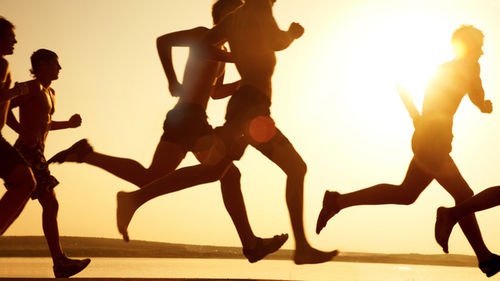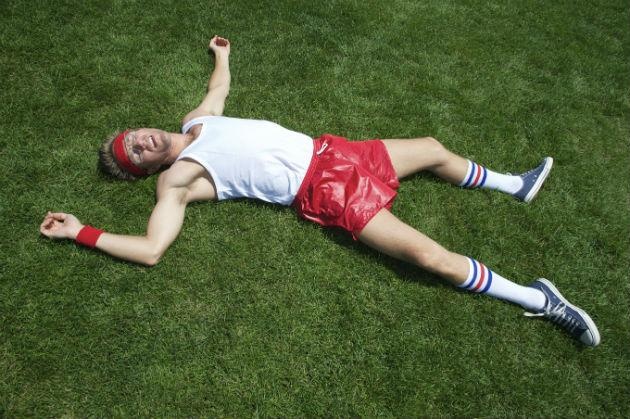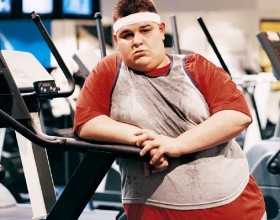
Welcome to the third and last chapter of my false statements about fitness. I hope you enjoy! :-)
CARDIO STRENGTHENS MY LEGS. In order for a muscle to get strong, it needs a substantial overload, and cardiovascular training doesn’t provide it. This type of training only increases endurance, and has no effect of muscle strength. Those who think that running, biking or elliptical training are enough, are mistaken. Cardiovascular training alone often triggers muscle loss, while integrating it with lower body strength training can not only avoid that loss, but it can also decrease chances of injury while performing cardiovascular training.

IF I’M NOT SORE THE DAY AFTER WORKING OUT, I DIDN’T TRAIN HARD ENOUGH. Muscle soreness relates to the type, intensity and volume of a workout, but we experience it only when these parameters change. If we haven’t trained for a while, we will likely feel soreness up to 3 days after our training session. However, after a few workouts we won’t hurt as much, because our body will adapt to the training regimen. At this point, if we change anything in our session we will likely be sore the following day, because we won’t have given our body the opportunity to adapt to the new training demands. For instance, let’s say we are used to doing our cardiovascular conditioning on an elliptical machine; if we suddenly hop on a treadmill for a run, chances are that the following day we will be sore. The same will probably happen if we strength train with a completely new routine, or if we change the number of sets, repetitions, or even the overload. Anything new to our body – anything it’s not prepared for – will cause more micro-traumas inside our muscles that will need to be repaired. And it’s exactly this repairing process – happening hours or days after the incriminating session - that cause the soreness. I know most people need to feel sore the day after a workout, but it just doesn’t make sense. Athletes train every day for hours, and they are not sore all the time.

RESULTS COME FROM TRAINING EVERY DAY FOR AS LONG AS WE CAN. All the improvements we make are the result of careful planning. Training means stressing our body, so it’s necessary to schedule enough time to rest. The recovery phase of our adaptation is essential, otherwise (1) we drastically increase chances of injury, and (2) we waste some of the effort made during our workouts. We want to make sure to provide our system with the opportunity to safely and efficiently heal from the stress, adjust to the new demands, and rebound with enhanced abilities to sustain the training regimen. There’s always room for days off, and workouts shouldn’t last more than we can safely manage. If time is an issue, even shorter bouts of exercise will do the job, as long as they are intense. Quite a few studies are actually showing that shorter sessions may be more productive, because people tend to work harder with fewer chances of getting burned out. In addition, when workouts are shorter people are less likely to skip them.

I HAVE BEEN DOING THE SAME WORKOUT FOR YEARS, BECAUSE IT WORKS FOR ME. Everybody has his or her own “best fit” in terms of training programs. Some people love lifting heavier loads, while others would rather use lower weights and increase rhythm. Some enjoy circuit training, while others prefer to take a break in between sets. Training programs are designed to fulfill the specific goals of each individual, but eventually everybody finds what works best for them. Nevertheless, this doesn’t mean they should repeat the same routine indefinitely. If we keep doing the same thing over and over again, eventually we’ll reach a plateau, and we’ll stop improving. Actually, if we don’t change the training regimen, we will start losing some of the gains we have made. In addition, by repeating the same exercises in the same way we will become more susceptible to injury. We need variety in our training programs, and it’s important to keep changing in order to continue to move forward.

IF IT WORKS FOR ME, IT WILL WORK FOR EVERYBODY ELSE WITH THE SAME GOALS. We are all different, and our bodies react differently to the same training program. Just because something worked well for me, it doesn’t mean it will be that effective for somebody else. Training programs need to be personalized, and must take in consideration individual differences. Obviously, there are general principles that go for everybody, but every section of the regimen must be tailored to the specific needs, goals, characteristics and expectations of each individual. If a runner is training to reach a certain milestone, he/she shouldn’t be using the same training program an Olympic champion posted on the Internet and did 20 years ago when he/she was competing; this runner is a completely different person with different characteristics, and will react to the same training in a different way. Likewise, a specific weight loss program may allow some people to obtain amazing results, while it may be ineffective for others. It’s all about trying different systems until we find what works best for us, and being conscious that we are all unique.
* * * * * * * * * * * * * * * * * * * * * * * * * * * * * * * * * * * * * * * * * * * * * * * * * * * *
If you like my articles, please click on the "BUZZ" button on top of the blog. I truly appreciate your support. Thank you.
If you want to write blogs but are not registered with Film Annex yet, REGISTER HERE and start your journey. You will be joining a family of writers coming from all over the world eager to read your stories. As soon as you register, SUBSCRIBE to my page on Film Annex: you will be earning money in no time! :-)
If you are already writing on Film Annex, I suggest that you should read this article: it will show you what you need to do to write good blogs and be successful on Film Annex. Would you like to know me more? Watch MY INTERVIEW WITH FILM ANNEX, and learn my opinion about social media and digital literacy around the world.
Giacomo Cresti
Senior Editor Annex Press
Film Annex
If you have missed any of my previous articles, you can find them on my personal page: http://www.filmannex.com/blog-posts/Giacomo
You can follow me on Twitter @giacomocresti76 and connect on Facebook at Giacomo Cresti.



